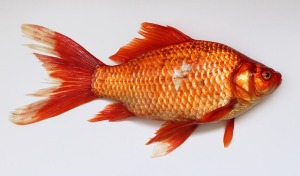 During World War II prisoners of war often contracted “barbed wire disease.” It was not the result of maltreatment, but of lack of stimulation. Ships’ crews, explorers, and people in monasteries contract it too. It is characterized by irritability, restlessness, pessimism, and boredom. Nothing excites them. They lack vitality, freshness, energy, and verve. Writers and artists—often those working on a project steadily for a long time, especially without feedback—may develop a form of barbed wire disease.
During World War II prisoners of war often contracted “barbed wire disease.” It was not the result of maltreatment, but of lack of stimulation. Ships’ crews, explorers, and people in monasteries contract it too. It is characterized by irritability, restlessness, pessimism, and boredom. Nothing excites them. They lack vitality, freshness, energy, and verve. Writers and artists—often those working on a project steadily for a long time, especially without feedback—may develop a form of barbed wire disease.
They go flat and their work becomes a burden and its quality suffers grievously. When work is drudgery creativity quickly declines. You’ve experienced that, sometimes for considerable periods of time, and sometimes to the extent that you don’t want to face the work and so you avoid it, entering a stage of total non-productivity about which you feel miserable. No two ways about it, you’ve now come eye to eye with a major obstacle.
I’m sure I am not the only serious writer who after working steadily and intensely for a long time writing, writing, writing, writing experiences a “word nausea” when you become sick of the sight of written words. For a time you cannot write; nor can you tolerate reading another word. When you’re experiencing a writer’s or painters barbed wire disease,  you can always imagine a more exciting place to be, a more exciting thing to be doing, and exciting people to be doing it with. Sometimes the disease spreads and everything turns gray and seems boring beyond belief. When you’ve burned out and bored you “kill time,” hoping the barbed wire disease will blessedly pass.
you can always imagine a more exciting place to be, a more exciting thing to be doing, and exciting people to be doing it with. Sometimes the disease spreads and everything turns gray and seems boring beyond belief. When you’ve burned out and bored you “kill time,” hoping the barbed wire disease will blessedly pass.
Here’s what you can do:
Strategies
If your interest starts to decline make the “boring” task a game. In my first writing job I wrote grant proposals for an organization. I wrote many, many of them. At the beginning, the proposals were quite long and the success rate quite high. Millions of dollars were raised. Writing grant proposals every day from 8:30 to 5:00 is a ritual that is not nearly as stimulating as writing a poem or novel, as you can imagine. They are dry, and after a number of them you burn out. I needed a more interesting, more challenging goal. So then my goal became to raise the level of funds the organization received as a result of my proposals relative to the length of the proposal—to write the shortest possible proposals for the most money. Eventually the proposals were extremely short, but just as successful.
How could you make your work a game, a contest? One way is to monitor your daily production and make the aim of the game to produce more every day compared to the previous days. Every hour I monitor the number of words I’m producing and look at yesterday’s tallies.
Focus continually on your overall goal. Success in life is often built on tedium. Tedium can be tolerated if it must be endured to achieve a larger purpose that matters a great deal to you–to write a good book, to have your work in galleries, to be satisfied and successful. The French Pointillist painter Georges Seurat was certainly bored some of the time–perhaps most of the time—when for two years he applied those almost three and a half million tiny dots of various hues to a ten foot wide canvas to paint Sunday Afternoon on the Island of La Grande Jatte, the painting that altered modern art and introduced Neo-impressionism. But that was his purpose, and his boredom was irrelevant to him.
Choose to do what you’re doing. Boredom is often caused by the sense that you’re being forced. But when you declare your right to make a decisive choice and say to yourself, “I’m choosing to do this of my own free will,” your outlook changes dramatically.
Focus on external rewards. When you’re bored, the work has lost its intrinsic value to you so think of other rewards: “I may not be happy with the work but I’m going to make a lot of money, and maybe I’ll win an award.”
Have the intention of doing just what you’re doing, nothing else—no distractions, no impediments, no worries, fears, or self-doubts. Just you and the work. Boredom is caused by the wish that there were something else you were doing: “I wish I were…” at a movie, or making love, or sitting in the bleachers. Make what you’re doing the single thing at that time you have every intention of doing. You don’t change the task. You change your attitude. You can mesmerize yourself with the thought, “This, now, right now, is the one thing in the world I want to do. Nothing could be better.”
Look for something of interest in the work and in the process of working–even if you have to look hard. There is always at least a tiny core worthy of your interest in everything, like the eye of a violet. What is boring for your friend may be the most exciting thing in the world for you. That’s because nothing is intrinsically boring. Physicists and  mathematicians love spending their lives scribbling figures on chalkboards. Would you like to spend your best hours doing that? But people do. And then again many people would find what you love doing—producing artistic work as often as you can—about as unpleasant an activity as they can imagine.
mathematicians love spending their lives scribbling figures on chalkboards. Would you like to spend your best hours doing that? But people do. And then again many people would find what you love doing—producing artistic work as often as you can—about as unpleasant an activity as they can imagine.
If you tell yourself something is boring that’s just how you’ll find it, so never use that word or any such word. Eliminate them from your vocabulary starting now. Our emotions follow what we’re thinking, including boredom. Instead of, “Oh, man, I can’t stand this anymore,” think, “To say I can’t stand it is incorrect. It’s an exaggeration. I can stand it. I will stand it.” Instead of, “Damn, is this tedious” replace it with an interest-inducing statement: “There is something stimulating here. All I have to do is stay focused long enough to find it. Look—there’s something interesting!” By focusing and absorbing yourself in something, it becomes more interesting. And the more interesting it becomes the more you’ll be drawn to it, the more attention you’ll want to give to it, and the more engrossing it will become.
The famous naturalist Louis Agassiz was known for turning out students with incredible powers of observation. Many of them went on to become eminent in the field. A new student appeared and asked Agassiz to teach him. Agassiz took a fish from a jar of preservative and said, “Observe this fish carefully and when I return be ready to report to me what you noticed.”
 Left alone, the student sat down to look at the fish. It was a fish like any other fish. There was nothing special about it. The student finished looking and sat waiting, but no teacher. Hours passed and the student grew restless. He asked himself why he had hooked up with an old man who was obviously behind the times.
Left alone, the student sat down to look at the fish. It was a fish like any other fish. There was nothing special about it. The student finished looking and sat waiting, but no teacher. Hours passed and the student grew restless. He asked himself why he had hooked up with an old man who was obviously behind the times.
Bored and with nothing else to do, he counted the fish’s scales, then the spines of the fins, then drew a picture of it. In doing so he noticed it had no eyelids. He continued drawing and noticed other features that had escaped him. And he learned that a fish is interesting if you really see it.
Persevere longer with whatever bores you. The person who holds uninteresting ideas in mind until they gather interest will succeed. Many people give up too quickly.
Wait. The sense of boredom may go away on its own without you doing a thing.
Tackle the most interesting part of the job first. Most tasks have features that you find boring and others that you find more interesting. Bodybuilders often start their workouts with lifts they enjoy most. Once started, they go on to the lifts they enjoy less. Try to do the same whatever you’re lifting.
Aim for more difficult goals. If the goals you’re pursuing are too easy, you’ll be bored.
Alter your routines. Sometimes it’s not the tasks that are boring, but the routine of carrying them out. Change your schedule. People need change or they go as stale as old cookies. Much of the time our lives grow stagnant, unhappy, and mechanical for no other reason than that the same things are done in the same way, at the same time, with the same people with no variation, like a broken CD that plays the same phrase over and over. It’s torture. How many times can you follow the same never-changing routines without going nuts?
Stay physically active. Hit golf balls or get down on the floor and do pushups. Creative work requires intense, exhausting mental concentration and benefits from a “physical” break.
Take periodic breaks. Working hard in short, intense, concentrated spurts, with rest periods between spurts proves to be the best way to work.
 Let your mind wander. Don’t resist. During boredom our minds wander and we daydream, and daydreaming and mind-wandering often lead to the solutions to our problems.
Let your mind wander. Don’t resist. During boredom our minds wander and we daydream, and daydreaming and mind-wandering often lead to the solutions to our problems.
Get yourself temporarily to another project. Most artists have more than one project going on simultaneously—some have many. If one becomes boring, they work on another. Painters work on small paintings as a break from large paintings. Writers alternate research and writing and write short stories to break the monotony of long, uninterrupted work on a novel.
Eliminate what you find boring. Let’s say you’ve tried everything your inventive mind can conjure up and you’re so bored you can hardly breathe. If you’re that bored and that burned-out maybe you shouldn’t do it anymore. Maybe the boredom is a message telling you the book or the sculpture isn’t a good idea after all and you should go on to another. Identify the specific activities that bore you and are burning you out and slice them off like shavings off a stick.
© 2015 David J. Rogers
For my interview from the international teleconference with Ben Dean about Fighting to Win, click on the following link:
Order Fighting to Win: Samurai Techniques for Your Work and Life eBook by David J. Rogers
or
Order Waging Business Warfare: Lessons From the Military Masters in Achieving Competitive Superiority
or


Hmm yes. Boredom is a strange thing. I’ve noticed that it can be a resistance to something. Sometimes I will be worried about a particular part of a project, not want to do it and then mysteriously get ‘bored’ by it. When I was younger, I used to think that meant that I should stop doing it. Now, I’m wiser 🙂 Mind you, some projects or roles have a natural lifespan, and when you’ve finished with it, it can feel a bit like angsty boredom. I guess the important thing is to know the difference between the two 😉
LikeLiked by 1 person
Sara, you make a very good point about different types of boredom–different causes of boredom–and the importance of being able to tell the difference. Thanks for the comment. Spring here and beautiful weather.
LikeLiked by 1 person
Yay, for Spring! It’s been a long wait, yes?
It’s been cool and rainy here over the entire Easter weekend – which is completely normal.
It’s interesting that you wrote about boredom, because I mentioned boredom this week as well, as a symptom. I’m not a person who suffers from boredom, but I felt it creeping in, just under the surface last week. It was a signal to me that I needed to change something – there was a stagnancy or a resistance somewhere. Anyway, I located it :). You kind of have to be a detective in your own life sometimes don’t you?
LikeLike
Sara, I like your detective analogy, ferreting out what is going on with ourselves. I’ll have to give that more thought.
LikeLiked by 1 person